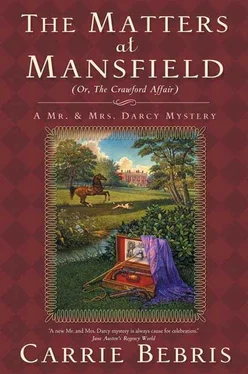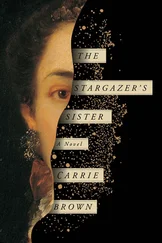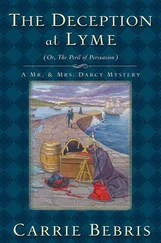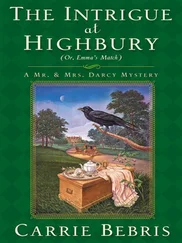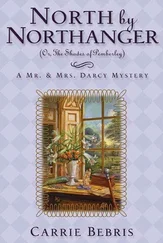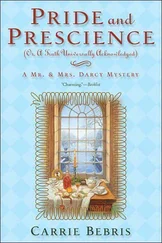“I offered to call upon Sir Thomas, but Lady Catherine bade me wait. She said Mr. Archer would handle it.”
A minute later, the inn door opened to admit the solicitor, a dark silhouette against the pale daylight behind him. Mr. Archer was dressed in the same black suit he had worn the day before, or perhaps an identical one; he did not project the impression of a gentleman wont to enliven his wardrobe with variety. Such as color.
He appeared surprised to find their small party assembled, and consulted his pocketwatch. “Half past eight already? Still, rather early for breakfast.”
“Perhaps in London,” said Mrs. Gower, bringing out additional tea, toast, rolls, and rashers. Elizabeth hungrily reached for a roll and spread it with strawberry jam. The long night had left her famished, and she expected this day to prove still longer.
As Mr. Archer moved farther into the room, Elizabeth noted that his suit indeed sported a bit of color — a stripe of yellowish sheen near his left knee. He crossed to the staircase, where the descent of Lady Catherine halted his progress. A look passed between them, her brows rising in question. He responded with a nod so slight as to be almost imperceptible. After she passed, he proceeded to his own chamber.
Her ladyship settled into a chair at the head of the table. “Mrs. Darcy, who attends Anne presently?”
“She woke and desired solitude in which to order her thoughts. She said she would call for one of us or your maid if she required anything.”
The room darkened as more clouds passed over the sun. Her ladyship’s countenance darkened as well.
“Someone ought to sit with her and engage her in constructive discourse, else she might indulge in melancholy.” There was little doubt who the “someone” was that Lady Catherine had in mind.
Much as Elizabeth sympathized with Anne’s plight — both her recent marital mess and the lifelong misfortune of fate having assigned Lady Catherine as her mother — she had maternal matters of her own occupying her attention this morning. She anticipated that today would bring confirmation from Georgiana or Lily-Anne’s nurse of their safe arrival at Pemberley, and until she received it, thoughts of her daughter would command the majority of her consciousness. Though she trusted that all went well, she had never before been separated from the child for such a long period of time, nor by so great a distance, and she missed the little person who had in so few months wrought such significant changes in her life.
“You are well attuned to Anne’s needs.” Elizabeth tried not to choke on her roll along with the words. “What comfort her mother’s presence would bring her.”
“I will see her following breakfast.”
“Perhaps your ladyship might breakfast with your daughter. I wish I could breakfast with mine this morning.”
“Lily-Anne is an infant. Of what possible interest could her presence be to you or any of us? Children are best left to their nurses until they not only have learned to speak, but have attained sufficient years and experience to have something worthwhile to say.”
“Surely by now your own daughter has acquired both.”
“The events of recent weeks prove that my daughter’s maturity does not include enough sense to act in her own interest. Therefore, she can have nothing to say at present that would concern me. And even if she did, the guest rooms of this establishment are far too cramped to dine in comfortably, otherwise I would have ordered a tray to my own chamber. I shall breakfast right here.”
A serving maid brought an empty teacup and plate to Lady Catherine and lit a candle on the table against the growing darkness. A storm was gathering.
“I require tea,” Lady Catherine said.
The maid checked the pot in front of Elizabeth. It was half-full and still steaming. She lifted it to pour, but Lady Catherine covered the top of her teacup with her hand.
“I want a fresh pot. And take care that the water is newly drawn. I will have none of the reboiled sludge you attempted to impose upon me yesterday.”
“I swear, ma’am, the tea yesterday—”
“No reused leaves, either.”
“Oh, ma’am! We never—”
“Or excuses.”
“Yes, ma’am.” The poor girl hurried off before Lady Catherine threatened to pour the boiling water over her.
Elizabeth took a pointed sip from her own cup. “The tea here is not the best I have ever been served, but it is not bad.”
“That, Mrs. Darcy, illustrates the difference between us. You are accustomed to accepting inferiority. I am not. When I want something, I do not settle for less.”
The tea arrived. Fortunately for the serving girl, Meg entered from the outside door just as she started to pour, thus drawing Lady Catherine’s derisive gaze to a new target.
“Humph,” Lady Catherine said under her breath. “I see the common dining room just became more common.”
Meg regarded their party uncertainly, though she did not appear to have overheard Lady Catherine’s snub. She went to an empty table in the corner. The sky outside had completely darkened, and the maid brought out another candle for Meg. In the flickering light, she looked lonely sitting there by herself, watching the flame as if she were not sure where else to direct her attention.
Elizabeth called over to her. “Mrs. Garrick, we have nearly finished our own breakfast, but you are welcome to join our table.”
Lady Catherine’s teacup clanked onto its saucer as a fit of coughing seized her.
Meg jumped up. “Oh, dear!” She hurried over to Lady Catherine and delivered three sharp blows to her back. As she prepared to offer a fourth, Lady Catherine seized her wrist.
“Stop assaulting me!” she sputtered.
“You were choking.”
“I merely downed my tea incorrectly, you featherbrain!” She issued a final, deep cough, then drained her teacup to clear her throat. She straightened her spine in an attempt to recapture her dignity.
Meg gave Lady Catherine’s back a final, gentle pat. “There, there. My mother had trouble feeding herself too, toward the end. Try eating more slowly.”
“The end? The end of what?”
Meg met Elizabeth’s gaze and shook her head sympathetically. “They become so irritable when they begin to lose their independence.”
A clap of thunder sounded, followed by the fall of rain. It came heavily, sluicing both the ground and Elizabeth’s spirits, for it trapped her inside with Lady Catherine.
In the courtyard, the trot of a horse signaled the arrival of a traveler. The animal emitted an unhappy neigh. It was not a traveler, however, but the ostler who hurried in a few moments later. His gaze swept the company, lighting at last on Darcy.
“Beggin’ your pardon, sir, for disturbin’ your breakfast, but Mr. Crawford’s horse is here.”
Lady Catherine’s teacup clattered a second time. “The scoundrel has returned? Impossible.”
“No, ma’am, not him. Just his horse. The saddle’s empty.”
Lady Catherine scoffed. “Then how do you know the mount is Mr. Crawford’s?”
“There’s no mistaking the animal, ma’am. Not with a scar like that.”
Darcy and Colonel Fitzwilliam left the ladies inside and subjected themselves to the deluge to see the horse for themselves. By the time they reached the stable, a boy had already unsaddled the mount and was rubbing her down. The horse was disfigured as Anne had described. It was indeed Charleybane.
Darcy inspected the saddle but noted nothing of interest. “Where are Mr. Crawford’s saddlebags?” he asked the stable boy.
“The horse didn’t return with none, sir.”
He exchanged a glance with his cousin. Mr. Crawford had left behind his valise and other luggage, but Darcy assumed he had fled the inn with something more than the clothes on his back. “Did he depart with saddlebags?”
Читать дальше
